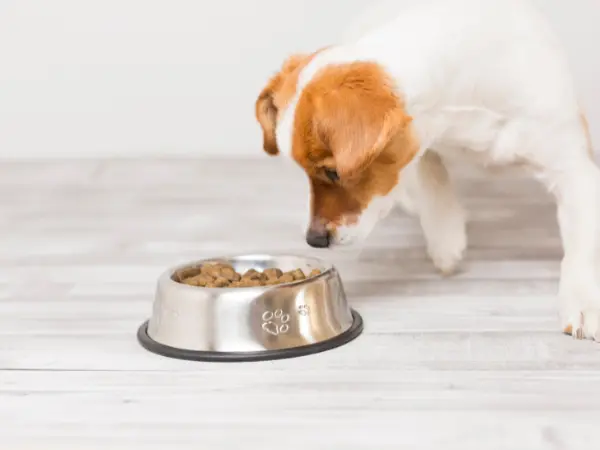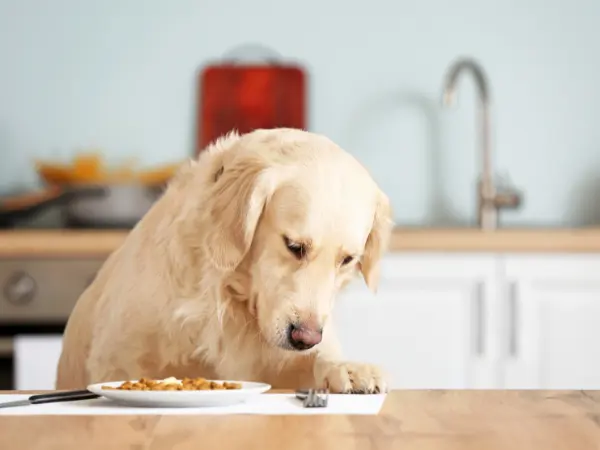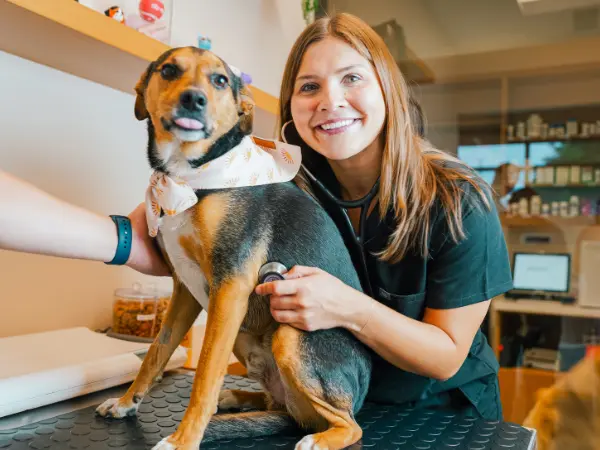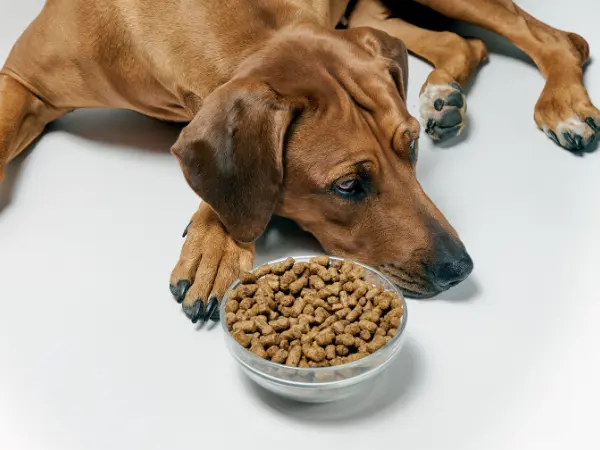Is your dog not eating like usual? This is a common issue that many pet parents face. A dog’s loss of appetite can be linked to stress, illness, environmental changes, or even picky eating habits. Sometimes, a dog not eating is a temporary issue; other times, it may be a sign that they need prompt veterinary care.
This Sploot Vets guide dives into why your dog might not be eating, what you can do at home, and when it’s time to call the vet.
Why Is My Dog Not Eating: 9 Possible Reasons
1. Food Preferences and Picky Eating
If your dog regularly turns their nose up at certain brands of kibble but is keen on eating other dry food or wet food, they might simply prefer certain tastes and textures. It’s also possible that your dog might be showing picky eating behaviors. This could mean that it’s time to consider changing dog food.
What to do next: Consult a veterinarian to confirm if your dog is not eating due to food preference. Vets can also guide you in choosing another AAFCO-compliant dog food, appropriate for your dog’s life stage.
2. Change in Dog Food
If you’ve recently changed your dog’s food, this could be affecting their appetite. Your dog may not like the new flavor or texture. In addition, a sudden switch in diet can upset a dog’s stomach, resulting in canine diarrhea, loss of appetite, and other symptoms.
What to do next: Let your veterinarian know about your dog’s reaction to the new food. They may recommend other options or encourage you to try introducing this new food gradually.
a. How to Change Dog Food [General Guidelines]
Sploot veterinarian Dr. Marissa Sallee recommends the following dog food transition schedule:
- Days 1 - 2 = 25% new dog food + 75% old dog food (1:3)
- Days 3 - 4 = 50% new dog food + 50% old dog food (1:1)
- Days 5 - 6 = 75% new dog food + 25% old dog food (3:1)
- Day 7 = all new dog food
b. How to Change Dog Food [Slower Transition for Sensitive Stomachs]
When switching dog food for dogs with sensitive stomachs, along with a fitting dog food choice, our veterinarians typically recommend a more gradual dog food transition schedule:
- First 1 - 2 weeks = 90% old dog food + 10% new dog food
- Next 1 - 2 weeks = 80% old dog food + 20% new dog food
- Next 1 - 2 weeks = 70% old dog food + 30% new dog food
- So on and so forth until the new dog food is completely weaned in.

3. Gastrointestinal Problems
Having an upset stomach, gas, constipation, and intestinal blockages can cause decreased appetite in dogs, along with discomfort and other symptoms. While gastrointestinal issues can have different causes, a few common culprits include ingesting something harmful, a sudden diet change, food intolerance, and the like.
What to do next: If your dog is experiencing symptoms such as vomiting or diarrhea, withhold food for a few hours, offer fresh water, and consult a veterinarian. Your dog may need urgent veterinary care if their symptoms are severe or prolonged (lasting more than 12 to 24 hours).
4. Recent Vaccinations
While FDA-approved dog vaccines help in preventing common, transmissible, and severe health issues, these vaccines may also have side effects. It’s normal for dogs to feel a bit “off” after getting vaccinated.
Mild fatigue, soreness, a low-grade fever, and a reduced appetite are typical immune responses after getting dog vaccines. These symptoms typically get better after one to two days.
What to do next: Monitor your dog closely; if your dog is not eating properly for more than 24 hours or develops other symptoms, contact your vet.
5. Stress or Anxiety (Separation Anxiety)
Changes in environment, schedule, or household dynamics can cause anxiety in dogs. Along with other symptoms, some dogs will not eat properly when experiencing anxiety or stress. For example, it is common for dogs with separation anxiety to lose interest in food when left alone or when separated from their pet parent.
What to do next: If you think that your dog is suffering from generalized or situational canine anxiety, consult a vet. Veterinarians may recommend lifestyle adjustments, behavioral training, and other supportive aids like calming supplements for dogs and dog anxiety meds, depending on the case.

6. Age-Related Changes
Senior dogs often experience a reduced sense of smell or taste, and this can potentially make some dog foods less appealing for them. Senior dogs are also prone to dental pain and slower digestion, which can also lead to a reduced appetite.
What to do next: In some cases, simply warming the dog food can help boost a senior dog’s appetite. You can also consider gradually shifting to dog food formulated for senior dogs; these foods can be more appealing and beneficial for older dogs. As with other dietary changes, we recommend consulting your veterinarian. If you suspect other reasons (like dental pain), a veterinarian can also help rule those out.
7. Medication Side Effects
Certain medications can temporarily alter taste or suppress appetite, causing some dogs to not eat like normal. Loss of appetite is a common side effect of the following medications:
- Antibiotics
- Anti-inflammatory meds
- Long-term anxiety meds (especially SSRIs)
- Pain medication for dogs
What to do next: If appetite loss continues beyond a few days of starting a new medication, talk to your vet about alternatives or supportive care.
8. Illness or Infection
A loss of appetite is often one of the first signs that your dog isn’t feeling well. Infections, organ problems, or systemic conditions can all cause your dog to stop eating normally.
What to do next: If you suspect your dog is sick, we recommend taking them to a veterinarian. If your dog’s reduced appetite is prolonged (more than 12 to 24 hours) or is paired with vomiting, lethargy, or fever, reach out to an urgent care veterinarian.
9. Dental Pain or Dental Issues
Canine dental issues (e.g., broken teeth, gum disease) can make chewing painful for dogs. For some dogs, this can lead to them chewing on only one side of their mouth to prevent pain. Meanwhile, some dogs with dental pain may refuse to eat or eat less than their usual.
What to do next: If you suspect that your dog has a dental issue, we recommend reaching out to a veterinary care provider (like Sploot) that offers dental care for dogs.

What to Do If My Dog is Not Eating Food
If your dog is not eating food, we recommend reaching out to a veterinarian. Generally, dogs lose their appetite due to health issues, dental issues, or dietary problems. A veterinarian can provide personalized guidance, regardless of the cause. Veterinarians will help rule out any possible medical causes, which is the crucial first step, and explore the most fitting solution/s to help your dog.
Home Remedies for Sick Dogs Not Eating
If your dog is sick and recovering, but still alert and drinking water, a few gentle home remedies might help stimulate appetite. Here are some tips you can try at home:
- Warm up their dog food slightly – this enhances aroma and appeal.
- Try adding pet food toppers – this can be plain, unseasoned chicken or beef, along with other healthy food options for dogs
- Try adding low-sodium broth – This helps add flavor and hydration, especially for dry dog food.
- Offer plain cooked chicken and rice – This is gentle on the stomach and easy to digest.
Note: These remedies are for short-term use only. If your dog refuses all food for 12 to 24 hours or more, contact an urgent care veterinarian near you.
When Should I Be Worried About My Dog Not Eating?
While some dogs may have reduced appetite due to picky eating, food preferences, or after eating too many treats, here are clear signs that your dog needs to see a veterinarian urgently:
- Your dog hasn’t eaten for more than 12 to 24 hours.
- Aside from not eating, your dog is also vomiting, lethargic, or showing signs of pain.
- Your dog has prolonged appetite loss and is also a puppy, a senior dog, or has a chronic condition; these dogs may weaken or deteriorate faster if they don’t eat properly.
Final Thoughts on Dogs Not Eating
When your dog is not eating, it can be due to various reasons—some of which need urgent care. A missed meal may not always be alarming, but persistent appetite loss in dogs deserves careful attention. As a final reminder, don’t hesitate to seek professional help when needed, especially if other concerning symptoms appear.

Sploot Vets: All-in-One Vet Care for Your Dog
Whether you’re worried about your dog not eating or other canine health issues, Sploot Vets is here to help. We’re here to help your canine companion stay at their healthiest and happiest with top-tier veterinary care.
We offer all-in-one care, with preventive care, urgent care, and emergency services all under one woof™. Aside from next-level care, our Fear Free approach prioritizes your dog’s comfort and well-being in every vet visit.
Check out any of our serene, modern vet clinics in Chicago, Denver, and Colorado Springs. Our doors are open 365 days a year with extended clinic hours to fit your schedule.
Easily book an appointment online or through the Sploot Vets app today!






